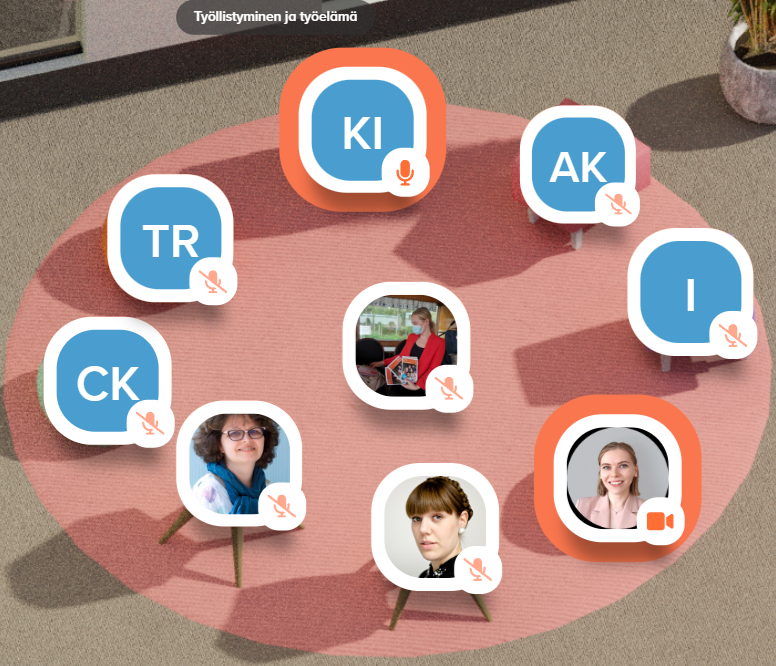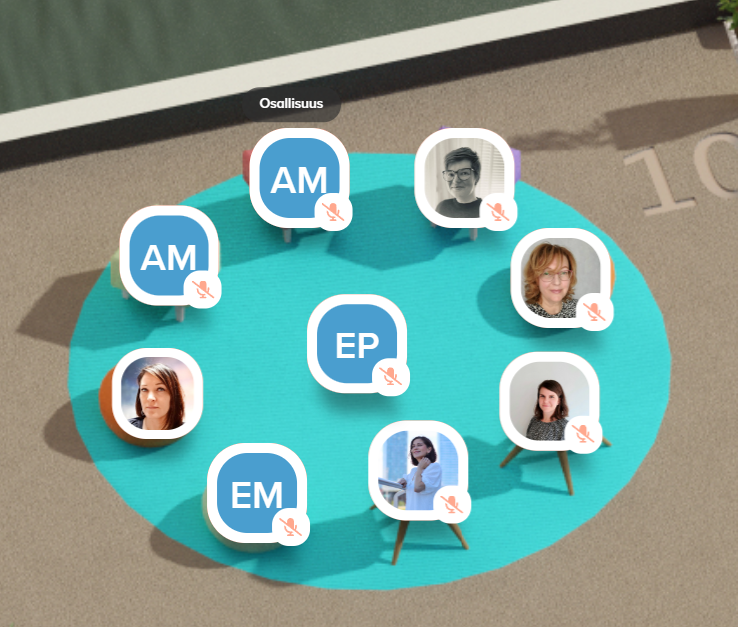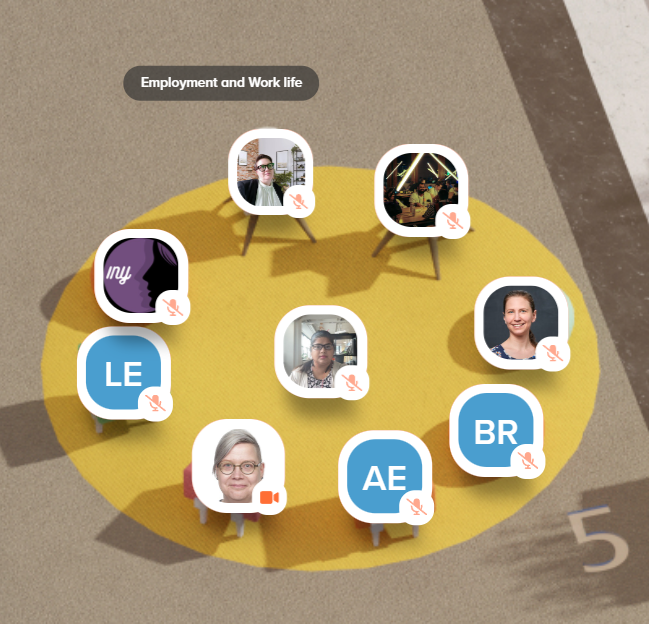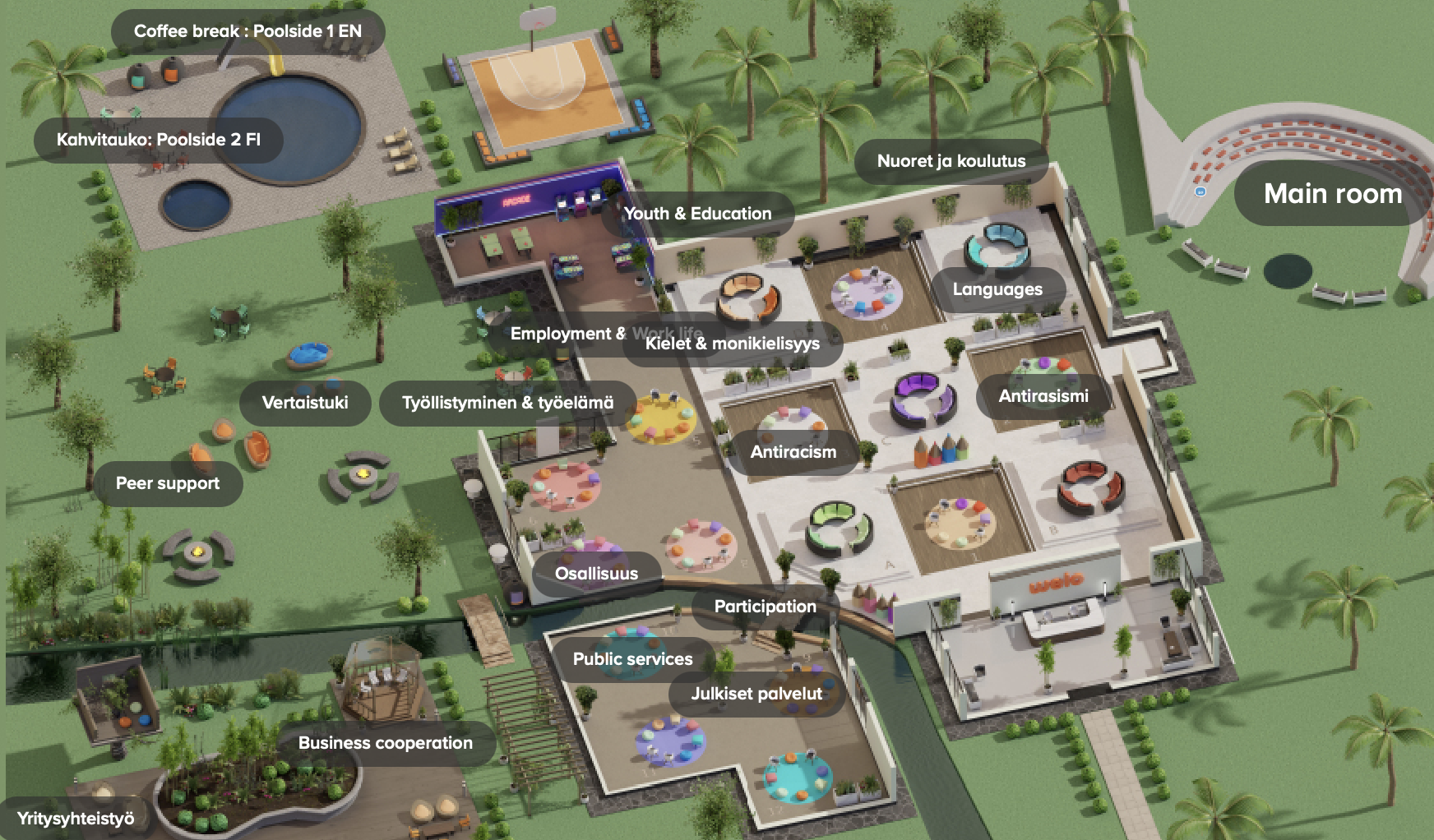The Cooperation Fair brought together different actors from the field of integration, from large-scale NGOs to grassroots volunteer-based associations, as well as representatives from the public sector, to discuss relevant issues that are currently shaping our communities.
Here are the highlights of the discussion themes:
Employment and work life
“They want us to integrate but what happens is we end up assimilating.”
The discussion shed light on the importance of understanding and transparency in addressing equality issues, particularly for vulnerable populations such as migrants. Creating open dialogues and accessible channels for reporting and seeking help is vital for ensuring a safe and equitable work environment. The lack of basic recruitment and HR skills among many Finnish employers showcases the need for targeted training and support to better equip them to manage a diverse workforce.
It goes without saying that employment is not always a sign of integration.
Moreover, the importance of advocating for the rights of foreign workers, including the provision of clear information in plain language by trade unions, is highlighted as a critical step in ensuring fair treatment and protection within the workplace. The emphasis on creating a comprehensive checklist for companies to consider when hiring foreign language workers reflects a proactive approach to fostering inclusivity and understanding within Finnish workplaces.

Peer support
During their discussion, the participants outlined the significance of peer support groups for migrants, emphasizing the closed and secure nature of these groups that foster understanding and safety. These communities serve as vital spaces for migrants to share experiences, connect with others, and tackle various challenges.
Peer support provides multilayer benefits. Including the promotion of a sense of belonging, the facilitation of networking opportunities, and the empowerment of individuals. These groups provide a platform for individuals to find their voice, reduce feelings of isolation, and cultivate a sense of hope and optimism. Additionally, peer support groups aid in challenging stigma and discrimination, imparting new skills and strategies, and validating individuals' experiences. Trust was mentioned as a key element, but how do we build and sustain it?
Youth & Education
How do we promote cooperation between schools and migrant caregivers? One approach mentioned during the round of discussions involves creating cultural bridges through workshops organised by associations, facilitating dialogue and understanding between parents and schools.
Additionally, encouraging the active involvement of municipalities in funding projects or training initiatives with migrant-oriented NGOs can foster support structures for migrant families. This would also include facilitating meetings between parents and school members, fostering communication and understanding regarding the educational development of the students.
Overcoming language barriers was identified as a crucial aspect, with suggestions for language training and provisions for interpreters to ensure effective communication between the school and caregivers. “Language is a big barrier for migrant-background parents who moved to Finland in the sense of understanding Finnish school systems.”
This comprehensive approach seeks to bridge the gap between migrant parents and the educational system in Finland, emphasizing the importance of cultural understanding, language inclusivity, and proactive involvement from both schools and caregivers. The focus on workshops, municipalities’ involvement, and language support mechanisms highlights the need to foster a more inclusive and supportive educational environment for all children, irrespective of their cultural backgrounds.

Participation
The importance of a bilingual approach, using plain language, was emphasized as means to ensure inclusivity and promote participation. The preference for face-to-face interactions over online meetings was also highlighted, arguing that it leads to deeper connections.
Safe space guidelines and effective moderation are also recommended to foster an environment where everyone feels comfortable contributing without fear of domination, regardless of the modality of the events.
Additionally, it was mentioned that the approach to migrant participation in organisations is evolving, with efforts focusing on viewing migrants not merely as the target group but also as potential employees and board members, aiming for more comprehensive integration within the society. However, despite the progress, there remains a need for practical assistance in certain regions.
Languages
It was noted that Finnish is not necessarily the common language at home for most migrant families, even if the other partner is a native. Most language courses are not sufficiently intensive, leaving individuals struggling to communicate fluently due to dialect and comprehension issues. This leads to difficulties in integrating into the social and educational aspects of Finnish life, affecting both school experiences and social interactions. Moreover, the exclusionary problems in schools create a dilemma for non-native speakers, impacting their ability to fully engage with the school staff.
A balanced approach that respects the importance of both the Finnish language and individuals' mother tongues. The overall message of the discussion highlights the changes in language requirements, advocating for a more inclusive approach that values linguistic diversity and the practical use of language in various real-life situations. The phrase "Flexible multilingualism is our future" encapsulates the necessity of adaptable and inclusive language policies for societal progress and integration.

Public services
The challenges faced by immigrants in accessing public services are extensive. Language barriers often pose a significant obstacle. Acknowledging the needs of various client groups is crucial, and improving the dissemination of information about available services through online platforms and social media seems more appealing, as these resources serve as crucial information hubs for many migrants.
Representation matters. By incorporating individuals from different cultural backgrounds into the staff of public institutions, a more welcoming and comfortable environment can be established, fostering a sense of security and understanding.
“If people from different countries work in these services, it can create a safer and more comfortable place for other immigrants using these services.”
It was noted that there is an evident push toward creating more inclusive public services, with a focus on amplifying the voices of marginalised groups through open dialogue and proactive engagement with organisations.
Antiracism
“Anti-discrimination policies: mandatory online training on harassment and discrimination for new employees.”
The discussion suggested several measures to address discrimination and promote inclusivity, for example, in the workplace. One potential solution is the introduction of anonymous recruitment, aiming to minimize biases in the hiring process. By removing identifiable information such as name, gender, or ethnicity, employers can focus solely on an applicant's qualifications, fostering a more equitable selection process.
Creating clear reporting channels for harassment and discrimination incidents can also help to cultivate a safe and supportive work environment. Encouraging a low threshold reporting system could empower employees to voice their concerns without fear of reprisal, fostering a culture of accountability and transparency within the organization.
Furthermore, the participants focused on the significance of broader community engagement in promoting anti-racist activities. Encouraging organisations and volunteers to partake in initiatives aimed at fostering good community relations and combating racism can contribute to a more inclusive society. By advocating for increased participation in anti-racist initiatives, the proposal suggests the importance of collaborative efforts in addressing systemic issues. More collective action in fostering a more equitable community.

Business cooperation
Beyond financial contributions, companies could provide valuable services such as expertise in web development, graphic design, and marketing. Some housing firms could offer NGOs spaces and short-term rental apartments, further facilitating their operations.
“Business-NGO collaborations may bid for public sector tenders, offering services like training and social work/ materials.”
However, it was noted that clear policies should be established to guide such cooperations and that understanding the strategies of companies is deemed crucial for establishing successful partnerships to maximise the benefits for both parties and the communities around them.
Through these thematic discussions, participants not only had the opportunity to voice their opinions and experiences but also engaged in meaningful encounters within the discussion rooms, expanding their networks in the process. By interacting in collaborative discourse, the participants were able to actively contribute to the themes. The Cooperation Fair not only facilitated exposure to fellow attendees but also enabled associations to establish connections with the broader network, emphasizing the value and benefits of collective effort within the field.




